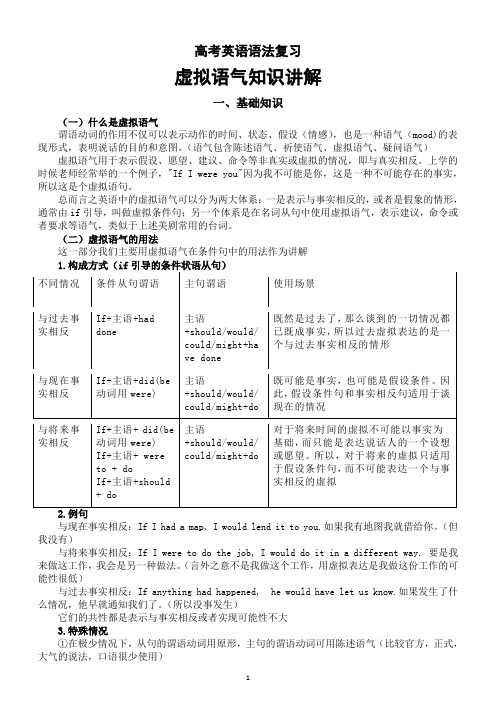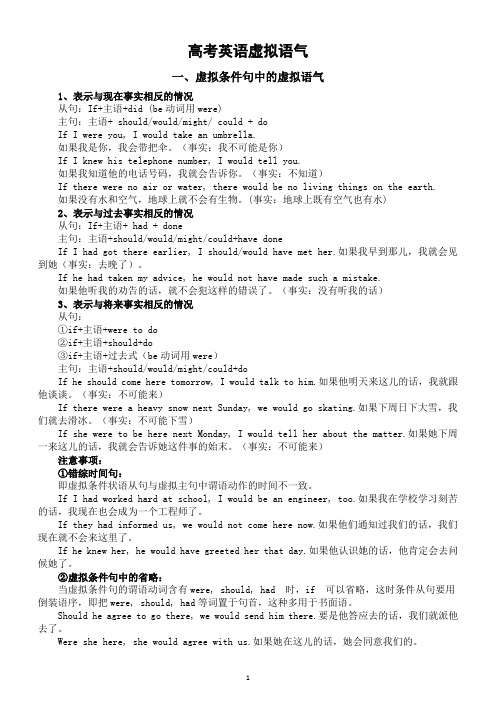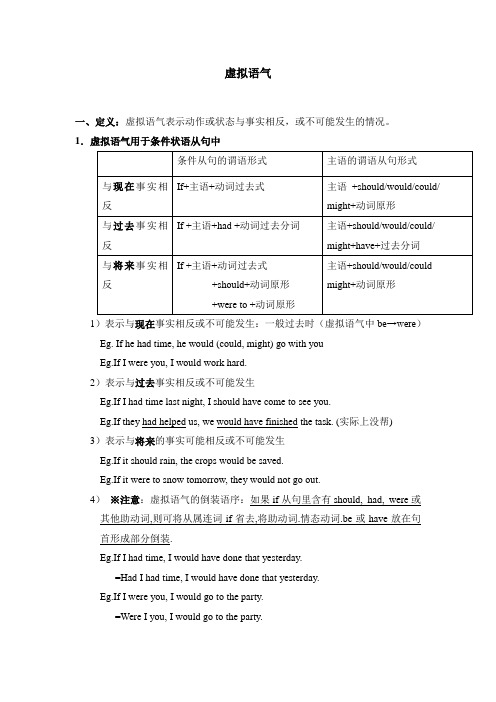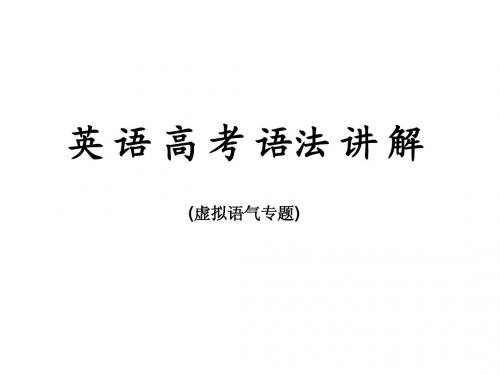高考英语语法复习——虚拟语气
- 格式:ppt
- 大小:160.50 KB
- 文档页数:25

高考英语语法复习虚拟语气知识讲解一、基础知识(一)什么是虚拟语气谓语动词的作用不仅可以表示动作的时间、状态、假设(情感),也是一种语气(mood)的表现形式,表明说话的目的和意图。
(语气包含陈述语气、祈使语气、虚拟语气、疑问语气)虚拟语气用于表示假设、愿望、建议、命令等非真实或虚拟的情况,即与真实相反。
上学的时候老师经常举的一个例子,"If I were you"因为我不可能是你,这是一种不可能存在的事实,所以这是个虚拟语句。
总而言之英语中的虚拟语气可以分为两大体系:一是表示与事实相反的,或者是假象的情形,通常由if引导,叫做虚拟条件句;另一个体系是在名词从句中使用虚拟语气,表示建议,命令或者要求等语气,类似于上述美剧常用的台词。
(二)虚拟语气的用法这一部分我们主要用虚拟语气在条件句中的用法作为讲解与现在事实相反:If I had a map, I would lend it to you.如果我有地图我就借给你。
(但我没有)与将来事实相反:If I were to do the job, I would do it in a different way. 要是我来做这工作,我会是另一种做法。
(言外之意不是我做这个工作,用虚拟表达是我做这份工作的可能性很低)与过去事实相反:If anything had happened, he would have let us know.如果发生了什么情况,他早就通知我们了。
(所以没事发生)它们的共性都是表示与事实相反或者实现可能性不大3.特殊情况①在极少情况下,从句的谓语动词用原形,主句的谓语动词可用陈述语气(比较官方,正式,大气的说法,口语很少使用)If that be the official view, it cannot be accepted.如果这是官方的看法,这是不能接受的。
②if可以省略,但是语序要改为倒装Were I Tom I would refuse.如果我是汤姆我会拒绝。




虚拟语气归纳复习一、虚拟语气在条件状语从句中(一) 虚拟条件句中的三种时态:1. 与现在事实相反:If + S +did / were , S + would /should / could / might+ do2. 与过去事实相反:If + S + had done , S + would / should / could / might + have done3. 与将来事实可能相反:If + S + did / were/ should do /were to do, S + would /should / could / might+ do1)If I _________________(be) tired, I _______________________(take) a rest.2)If I had known his address, I______________________________________(write) a letter to him.3)I you __________________(come) yesterday, you __________________________(meet) him.4)If I _____________________________(be) free tomorrow, I__________________( go) to the library.5)If the sun _____________________(stop) shining, only one smile from you____________________(make) theworld bright.6)I ___________________________(appreciate) it if you ______________(can) reply to me as soon as possible atyour convenience.7)Even if he ______________(be) here, he _______________________________(solve) the problem / issue.8)If he _________________________(drive) more carefully, he ___________________________(avoid) the caraccident yesterday.9)What ____________________________ (happen) if we _______________________________ (not work) hard?10)If the traffic ___________________(be ) so heavy, I could have been back by 6 o’clock.(二) 虚拟条件句中的混合时态:有时条件从句和主句的时态不一致,但必须有明确的时间状语表明不同的时间。


高考英语语法虚拟语气练习题30题(带答案)1. If I ______ (be) you, I would study harder for the college entrance examination.A. amB. wasC. wereD. had been答案:C。
解析:在if引导的表示与现在事实相反的虚拟条件句中,be动词一律用were。
选项A是一般现在时,不符合虚拟语气的语法规则。
选项B虽然是be动词的过去式形式,但在这种虚拟语气结构中不能用was。
选项D是表示与过去事实相反的虚拟语气中的用法,与本题的现在事实相反的语境不符。
2. If he had known the result of the exam yesterday, he ______ (not be) so sad today.A. isn'tB. wasn'tC. wouldn't beD. hadn't been答案:C。
解析:这是一个混合虚拟语气的句子。
从句是与过去事实相反(had known),主句是与现在事实相反,在这种情况下,主句要用would + 动词原形,否定形式为wouldn't + 动词原形。
选项A 是一般现在时的否定形式,不符合语法规则。
选项B是一般过去时的否定形式,也不符合混合虚拟语气的要求。
选项D是与过去事实相反的虚拟语气中主句的用法,不适合这里与现在事实相反的情况。
3. If it ______ (rain) tomorrow, we would cancel the football match.A. rainsB. rainedC. will rainD. should rain答案:D。
解析:在if引导的表示与将来事实相反的虚拟条件句中,有三种形式:动词过去式、should + 动词原形、were to+动词原形。
选项A是一般现在时,用于表示将来的真实条件句,不符合虚拟语气规则。


高考英语虚拟语气一、虚拟条件句中的虚拟语气1、表示与现在事实相反的情况从句:If+主语+did (be动词用were)主句:主语+ should/would/might/ could + doIf I were you, I would take an umbrella.如果我是你,我会带把伞。
(事实:我不可能是你)If I knew his telephone number, I would tell you.如果我知道他的电话号码,我就会告诉你。
(事实:不知道)If there were no air or water, there would be no living things on the earth.如果没有水和空气,地球上就不会有生物。
(事实:地球上既有空气也有水)2、表示与过去事实相反的情况从句:If+主语+ had + done主句:主语+should/would/might/could+have doneIf I had got there earlier, I should/would have met her.如果我早到那儿,我就会见到她(事实:去晚了)。
If he had taken my advice, he would not have made such a mistake.如果他听我的劝告的话,就不会犯这样的错误了。
(事实:没有听我的话)3、表示与将来事实相反的情况从句:①if+主语+were to do②if+主语+should+do③if+主语+过去式(be动词用were)主句:主语+should/would/might/could+doIf he should come here tomorrow, I would talk to him.如果他明天来这儿的话,我就跟他谈谈。
(事实:不可能来)If there were a heavy snow next Sunday, we would go skating.如果下周日下大雪,我们就去滑冰。



高考英语中虚拟语气的用法和注意点是什么在高考英语中,虚拟语气是一个重要的语法点,也是让许多同学感到头疼的部分。
虚拟语气用于表达与事实相反、假设、愿望、建议等情况,它的用法多样,且有不少需要注意的地方。
接下来,咱们就详细地探讨一下高考英语中虚拟语气的用法和注意点。
一、虚拟语气在条件句中的用法1、与现在事实相反条件从句用一般过去时(be 动词用 were),主句用“would / could / should / might +动词原形”。
例如:If I were you, I would take the job (如果我是你,我会接受这份工作。
)2、与过去事实相反条件从句用过去完成时,主句用“would / could / should / might + have +过去分词”。
比如:If you had studied harder, you would have passed the exam (如果你学习更努力些,你就会通过考试了。
)3、与将来事实相反条件从句有三种形式:① should +动词原形;② were to +动词原形;③一般过去时。
主句用“wou ld / could / should / might +动词原形”。
举个例子:If it should rain tomorrow, we would stay at home (要是明天下雨,我们就待在家里。
)二、虚拟语气在宾语从句中的用法1、 wish 后的宾语从句表示与现在事实相反,用一般过去时;表示与过去事实相反,用过去完成时;表示与将来事实相反,用“would / could +动词原形”。
例如:I wish I were as tall as you (我希望我和你一样高。
)2、表示“建议、要求、命令”等动词后的宾语从句这类动词有suggest(建议)、advise(建议)、insist(坚持要求)、order(命令)、demand(要求)等,从句谓语用“should +动词原形”,should 可以省略。



高考英语语法复习情态动词与虚拟语气知识讲解一、情态动词(1)表示能力时,can只用于一般现在时,could仅用于一般过去时;而be able to则有更多的时态,如将来时、完成时等。
I haven’t been able to read that report yet.He will be able to skate as well as you.(2)Was/were able to表示能力时,侧重经过努力而成功做到某事;而could仅表示具备能力,不说明是否实施了能力。
He studied hard and was able to pass the exam.(3)用在其他动词,如might,may,would,want,hope等之后表示能力只能用be able to。
He might be able to fix your car.(1)must还可以表示质问或感情色彩,意为“偏要,偏偏”。
Why must it snow on Saturday?(2)should还可以表示惊奇、愤怒、失望等特殊情感,尤其用在以why,who,how等开头的疑问句中或某些感叹句中。
why should you be so late today?(1)must作“必须”讲的一般疑问句,其肯定回答用must,否定回答用needn’t或don’t have to。
-Must I pay now?-Yes, you must./No, you needn’t.(2)need还可以作实义动词,有人称和数的变化,后跟带to的不定式作宾语。
She needed to go out for a walk.(1)两者在表示过去的习惯动作或行为时常可通用。
When we were children, we would/used to go skating every winter.(2)Used to与would都不能与表示具体频率、次数的词及特定的时间状语或具体的一段时间连用。

虚拟语气一、定义:虚拟语气表示动作或状态与事实相反,或不可能发生的情况。
1.虚拟语气用于条件状语从句中1)表示与现在事实相反或不可能发生:一般过去时(虚拟语气中be→were)Eg. If he had time, he would (could, might) go with youEg.If I were you, I would work hard.2)表示与过去事实相反或不可能发生Eg.If I had time last night, I should have come to see you.Eg.If they had helped us, we would have finished the task. (实际上没帮)3)表示与将来的事实可能相反或不可能发生Eg.If it should rain, the crops would be saved.Eg.If it were to snow tomorrow, they would not go out.4)※注意:虚拟语气的倒装语序:如果if从句里含有should, had, were或其他助动词,则可将从属连词if省去,将助动词.情态动词.be或have放在句首形成部分倒装.Eg.If I had time, I would have done that yesterday.=Had I had time, I would have done that yesterday.Eg.If I were you, I would go to the party.=Were I you, I would go to the party.Eg.If it should rain tomorrow, I would stay at home=Should it rain tomorrow, I would stay at home.2. 虚拟语气在宾语从句中的用法在动词wish后的宾语从句中,表示与现在或过去的事实相反,或对将来的主观愿望,从句通常省略连词that。
